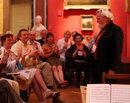Follow the money that drives science research in the United States, and more often than not you’ll end up in Washington, D.C. The dollars don’t reach labs on their own, though: Institutions, interest groups, and individuals help legislators decide what to fund — and science competes with every other federal program for resources.
This year scientific research is one of the few areas slated to gain ground in the proposed federal budget, but that budget is not law yet. “If people want to see the research and development funding increase they’re going to need to get up there and say, ‘Look we feel that we need those increases, they’re vital for the future, they’re vital for job creation [and] our future economic competitiveness,'” said Bob Simon, staff director of the Senate Committee on Energy and Natural Resources, at a session of the American Association of the Advancement of Science conference, on Saturday in San Diego, California.
Continue reading A Scientist’s Roadmap to Capitol Hill


 Charles Darwin may have had his biggest impact on biology, but he began his scientific career as a geologist. So it’s appropriate that earlier this year, retired geologist John Ramsay, who had long studied the famed biologist’s life, accepted a commission to compose a Darwin-themed string quartet.
Charles Darwin may have had his biggest impact on biology, but he began his scientific career as a geologist. So it’s appropriate that earlier this year, retired geologist John Ramsay, who had long studied the famed biologist’s life, accepted a commission to compose a Darwin-themed string quartet.